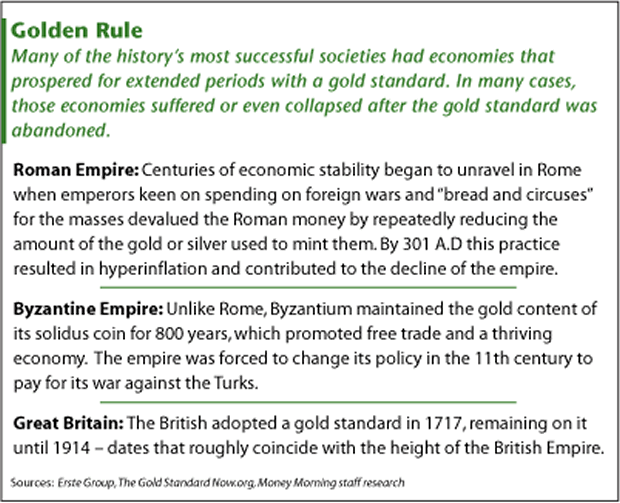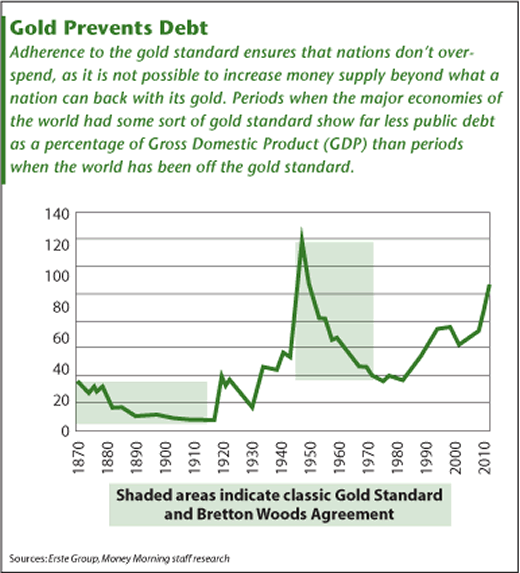Why the U.S. Should Return to the Gold Standard
Commodities / Gold and Silver 2011 Jul 12, 2011 - 05:17 AM GMTBy: Money_Morning
 David Zeiler writes: Should the U.S. return to the gold standard?
David Zeiler writes: Should the U.S. return to the gold standard?
It's a question that has taken on new relevance during a time of soaring deficits and sky-high national debt. Many of the world's most successful governments, from ancient Rome to the British Empire, enjoyed centuries of economic stability by adhering to a gold standard. And some economists credit the period of prosperity at the end of the 19th century to a global gold standard.
"The period of 1870 to 1914 recorded the highest real growth rates worldwide and was
among the most peaceful ones in history," says a report on gold released earlier this month
by European bank Erste Group. "Most of the budgets were balanced, and there was a free flow of capital across borders. The only job of the central banks was to exchange gold for paper or vice versa."
Even former Federal Reserve Chairman Alan Greenspan has noted the historical benefits of the gold standard.
"Some mechanism has got to be in place that restricts the amount of money which is produced, either a gold standard or a currency board, because unless you do that all of history suggest that inflation will take hold with very deleterious effects on economic activity," Greenspan told Fox Business News in January. "There are numbers of us, myself included, who strongly believe that we did very well in the 1870 to 1914 period with an international gold standard."
Money Morning Contributing Editor Martin Hutchinson agrees, and he is one of a growing number that believe the U.S. should return to the gold standard - even though he sees such a drastic change as unlikely.
"It would solve the unemployment problem, because expensive capital makes people use more labor," said Hutchinson. "And it would indeed enforce fiscal discipline."
Hutchinson concedes that such a drastic action would indeed have negative consequences, as well - but the long-term benefits of stability would be preferable.

"Stock markets would crash, bonds I'm not sure, because investors currently are relying on inflation to solve the U.S. debt problem," he said. "It could become dangerously deflationary."
Indeed, Hutchinson and others believe the United States should return to the gold standard to reverse years of U.S. Federal Reserve policies that have eroded the value of the dollar.
Still, that could be better than the alternative, which is watching the U.S. and other governments around the world attempt to print their way out of economic ruin.
An Inconvenient Solution
Many analysts fear that the Fed's policy of pouring $2.3 trillion into the economy in an attempt to spur growth is really only fostering inflation and devaluing the dollar - with potentially disastrous consequences.
Fixing the value of the dollar to gold would mean more money could not be printed unless more gold was obtained to back it up. Historically, economies using a gold standard currency enjoy stable prices - governments can't print the excess money that causes inflation - and governments without excess money can't spend themselves into massive debt.
That's why many local activists and legislatures are pushing for a return to the gold standard.
Social conservative group American Principles in Action joined forces with the Iowa Tea Party in June to set up a "Gold Standard 2012" bus tour that included appearances by several Republican presidential contenders.
Also last month, three Republican senators introduced a bill to Congress, the Sound Money Promotion Act, which would make it easier to use gold and silver coins as currency. Utah has gone even further - its Legal Tender Act of 2011 makes it possible to use gold and silver as cash, but with the value based on weight.
"Fiat currencies are frequently manipulated in such a way to finance the large-scale expansion of national governments," Sen. Mike Lee, R-UT, told Smart Money. "The expanded discussion about the need for at least the option of precious metal currency systems is because of that fear."
The world went off the gold standard in 1914 because the powers of Europe needed to print more money than the gold standard would allow in order to pay for World War I.
The gold standard reappeared just after World War II as part of the Bretton Woods agreement. The idea was to avoid the international monetary chaos of the interwar period, particularly the Great Depression, by tying currency to gold.
Unfortunately, only the U.S. dollar was actually convertible to gold; other currencies were pegged to the dollar. The system relied upon the U.S. government acting in a fiscally responsible manner.

"That wasn't a gold standard," Money Morning'sHutchinson said of Bretton Woods. "That was fiat money dressed up as a gold standard."
The large costs of the Vietnam War and President Lyndon Johnson's Great Society created such stresses on the U.S. monetary system that President Richard Nixon was forced to drop the gold standard in 1971.
So while history illustrates the benefits of the gold standard, it also illustrates why it has so often been left behind - ravenous government budgets, particularly when that hunger is fed by an emergency like war or economic distress.
Since the United States has both now, it would seem extremely unlikely that Washington lawmakers will agree to a return to the gold standard any time soon.
"Politicians like easy money too much," said Hutchinson.
Money Morning/The Money Map Report
©2011 Monument Street Publishing. All Rights Reserved. Protected by copyright laws of the United States and international treaties. Any reproduction, copying, or redistribution (electronic or otherwise, including on the world wide web), of content from this website, in whole or in part, is strictly prohibited without the express written permission of Monument Street Publishing. 105 West Monument Street, Baltimore MD 21201, Email: customerservice@moneymorning.com
Disclaimer: Nothing published by Money Morning should be considered personalized investment advice. Although our employees may answer your general customer service questions, they are not licensed under securities laws to address your particular investment situation. No communication by our employees to you should be deemed as personalized investent advice. We expressly forbid our writers from having a financial interest in any security recommended to our readers. All of our employees and agents must wait 24 hours after on-line publication, or 72 hours after the mailing of printed-only publication prior to following an initial recommendation. Any investments recommended by Money Morning should be made only after consulting with your investment advisor and only after reviewing the prospectus or financial statements of the company.
Money Morning Archive |
© 2005-2022 http://www.MarketOracle.co.uk - The Market Oracle is a FREE Daily Financial Markets Analysis & Forecasting online publication.



